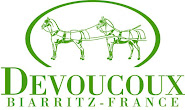
.....I had already looked around the scene in the US. Anyone that had a four star horse had stars in their eyes since they knew they had a good chance to ride in the world games. The rules were every country could send 6 riders, a team of 4 plus two official individuals, plus, an additional 6 national riders. So there were 12 slots. That is why there was such a scarcity of horses since any rider that had a potential horse didn’t want to turn loose of it.

Above: Jim Wofford on Carawich, Badminton 1979
It was about December 21st and I had given up. I thought my chances were pretty much over. And in December I called Lars and I said, “Lars, I’m looking for a horse for one of my clients.” I was looking for a school-master. I described the rider and what they could spend. He said, “Yes, yes, I’ve got several. By the way I have just hung up with Carawich’s owner who said Aly is expecting.” I said, “Call the owner back and tell them Carawich has been purchased.” I never rode him until he got here. I bought him untried. I rode him in the 1978 World Championship and was 10th and on the bronze medal team. I was the Silver Medalist at the Alternate Olympics in 1980. We won Rolex in 1981. I am especially proud of that because, it was not the first event at Kentucky Horse Park, but the first one sponsored by Rolex.
Jim Wofford and Carawich

In the summer of 1981 we took him to Germany because the 1982 World Championships were going to be there and the USET wanted an advance trip to see the course and the footing. Carawich broke his coffin bone in his right hind. We had to ship him home and he was quite lame for some time, was 6 months in the stall. He did eventually recover. Then we retired him in 1984 and he is still here, buried in the South paddock.
Q. When was the first time you referred to yourself as a professional event rider when asked the question “what do you do?”
A. Probably not until after 1984. Notice the way I say that because in 1984 the Olympic games were still ostensibly for amateurs only. For those of us like myself who had to scratch around for a living we had to be careful how we structured our business. If we were declared a professional we could never ride in the Olympics again. We were very careful not to refer to ourselves as professional. I retired in ‘84 and did not refer to myself as professional until then. They changed the rule a few years after that. It seems like another world, it was just stupid. A total anachronism.

Above: Jim Wofford and daughter Jennifer
with The Piedmont Hunt early '70's
Q. How did you balance raising children with an international eventing career?
A. It was a little easier 30 years ago than it would be now. First of all there were not so many events. Typically we would go to three events in the spring and then Rolex and that would be the end of the spring season. There would be four or five events in summer and early fall and those of us with Advanced horses would go to one or two horse trials and go to someplace like Radnor. Our time on the road was nothing like what the professionals have to do now. In addition, the spring 3-day event took place much later in the year, the first weekend in June, and then the Fall Championships took place the weekend of Labor Day or after. We didn’t have to start training so early in the year. The ramifications of that is that no one had to move to Florida or Southern California, depending on where you were. Gail and I shake our heads and think we never could have done it. We were dedicated to keeping our two daughters in the local school. Gail would have had to live here alone with two girls or I wouldn’t have been able to prepare. It was a very different scene.
Below: Jim Wofford with Jack LeGoff 1981

The difficulties were that occasionally in those days the team would travel for quite a long time. I was gone three months before the 1972 Olympics and six weeks before the ‘68 Olympics. Then, let’s see, we were gone for five weeks in 1980. I went abroad one final time in ‘83 and was away for three months before Burghley. That’s totally out of fashion now. These riders fly back and forth across the pond like it’s nothing. Back then trans-Atlantic travel was quite a big deal. Now they go to as many events in three months as I would in a season, and ride ten times as many horses.
We had to do other things with horses to keep ourselves occupied. There was not enough eventing to keep you off the street. Mike Plumb and Mike Page both won the AHSA equitation medal. Kevin Freeman, Mike Plumb, and I rode steeplechase races. They both rode in the Maryland Hunt Cup and placed. I never rode in the Hunt Cup but rode a lot under rules, including 2nd in the New Jersey Hunt Cup.

Jim Wofford in the 1981 Blue Ridge Point-to-Point
And that sort of all-around exposure is very difficult for these event riders to produce, because there’s always another event the next weekend. Current eventers don’t even know that they are missing that. The upper level riders are phenomenally better than we were in dressage. In the last five years they have become better than we were in show jumping but that is because they go to Florida early in the winter, right after Thanksgiving, and they spend six or eight weeks at the horse shows and jump their young horses. Now they’re getting that end of the education that we were able to provide ourselves.
The one thing missing is…….
Find out what upper-level riders are missing in the the third and final portion of the Jim Wofford's Interview by checking in next week!









No comments:
Post a Comment